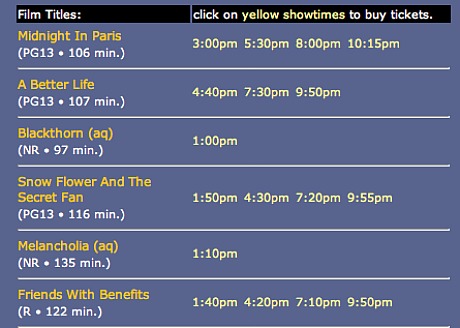Los Angelenos interested in catching Lars von Trier‘s Melancholia before its 11.11.11 domestic release date should scoot out to Laemmle’s Fallbrook 7 between today and next Thursday, 7.28. The gloomy apocalyptic drama began quietly playing yesterday on a one-afternoon-screening-per-day basis, and will remain there for six more days.

opened in various Nordic countries last May, and Oscar’s Foreign-Language Wiki page says that “unlike other Academy Awards, the Foreign Language Film Award does not require films to be released in the United States in order to be eligible for competition.”
The rules also say that (a) “Films competing in the Foreign Language Film category must have been first released in the country submitting them during the eligibility period defined by the rules of the Academy, and must have been exhibited for at least seven consecutive days in a commercial movie theater,” and (b) “The eligibility period for the Foreign Language Film category differs from that required for most other categories: the awards year defined for the Foreign Language Film category usually begins and ends before the ordinary awards year, which corresponds to an exact calendar year.”
In short, the reason that Magnolia has booked Melancholia at the Fallbrook is beyond my limited pea-brain capabilities,.
Here’s a portion of my Cannes Film Festival Melancholia review:
“Lars von Trier’s Melancholia is a morose, meditative in-and-outer that begins stunningly if not ecstatically and concludes…well, as you might expect a film about the end of the world to wrap itself up. Von Trier’s ensemble piece ‘isn’t about the end of the world but a state of mind,’ he said during this morning’s press conference. My thinking exactly.
“Melancholia is a much more striking thing for where it starts and what it attempts than how it plays.
“And yet I believe it’s the best…make that the gloomiest, most ambitious and craziest film Kirsten Dunst has ever starred in. Way bolder than Spotless Mind. It’s kind of La Notte-esque, now that I think about it. Dunst pretty much scowls all through Melancholia and does three nude scenes. What I really mean, I suppose, is that she’s never operated in such a dark, fleshy and grandiose realm.
“I can understand Cannes critics going ‘wow!’ over the film’s audacity or whatever (the moody-gloomy beauty, the melancholy current), but I can’t honestly see how they could call it a top contender for the Palme d’Or. It’s basically just a stylishly nutso, intriguing, semi-bombastic ensemble piece about despair in the face of eventual ruination . You know…the kind of thing that most HE readers have in their heads each and every day.
“I felt elation only in the very beginning, and somewhat at the very end. But otherwise it mostly felt like a meditative slog. It’s not without its intrigues but lacking tension and a through-line and a story, really, of any kind. I don’t imagine this film will be embraced by pro-family Christian groups, or even the rightwing end-of-days crowd (although…naah, forget it).
“The movie is never ‘boring’ but only rarely gripping. It’s Von Trier, after all, but when all is said and done it’s basically a downhill swamp-trudge with tiny little pop-throughs from time to time.
“There’s an overhead tracking shot of two horseback riders galloping down a trail during a foggy morning that’s heartstoppingly beautiful. That plus the beginning I will never, ever forget.
“Melancholia is definitely better than Von Trier’s Antichrist — I’ll give it that. Death dance, death art…when worlds collide. Von Trier had a mildly intriguing idea here but didn’t know what to do with it, or he perhaps didn’t care to try. All he does is riff about how tradition and togetherness are over and very few of us care. My sense is that Von Trier experimented and jazz-riffed his way through most of the filming.
“All I know is that I feel the way Dunst’s Justine feels during most of the film, and I’m not dealing with the end of the world. Vaguely scared, unsettled…something’s coming.”









